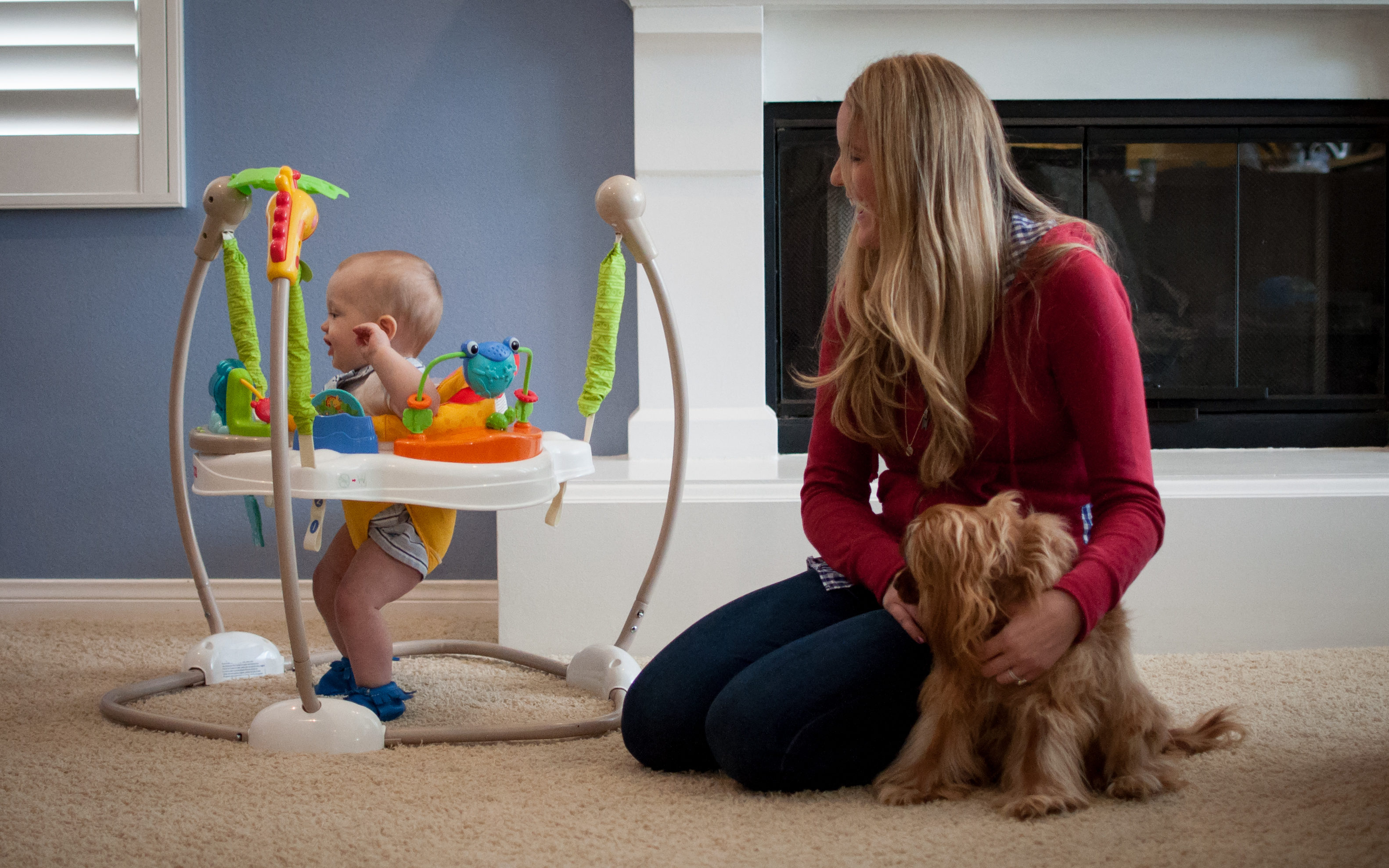Relief for Colorado parents raising babies, kids & dogs
Colorado life is always adventurous, and busy! Add kids and dogs to the mix, and a household can get pretty harried pretty fast. Sometimes it’s just too much energy. Sometimes interactions can spill over into something more serious.
Whether you’re just frustrated, mildly worried, or deeply concerned about interactions between your baby or children and your dog, we’d love to help restore household safety and harmony.
Baby on the way? We can also set everyone up for success by helping you prepare your dog for the arrival of your first child.
Do you struggle with a dog who…
- Makes walking with a stroller challenging
- Takes too much interest in diaper changing or feeding time
- Seems fearful or uncomfortable around kids
- Chews on the kids’ toys instead of their own
- Barks, growls, or lunges at children
- Nips at or jumps on kids
Imagine instead a dog who…
- Walks calmly alongside your stroller
- Rests on a dog bed during changes and feedings
- Is relaxed and calm around kids
- Understands which toys are dog toys
- Plays politely with children
- Keeps teeth out of the game and paws on the floor
No matter how challenging your household composition, we’re here to help. Even biting—just let us know what’s going on and we’ll tackle it. Without judgment. We’re in your corner.
We truly understand what you’re going through, and it’s our mission to help you enjoy peace of mind and household harmony.
Let’s Get Started: 2 Steps to Make Change
Step 1: Your Initial Behavior Assessment Consult
We’d love to bring you relief. If you’re ready, the first step is your initial consult.
Depending on your case and preference, you’ll meet with one of our behavior vets for a Behavior Vet Consult or one of our behavior consultants for a Head Start Appointment. You can come to our office, or we’ll come to your home for maximum convenience. (Not sure which team member you should meet with? Don’t worry; we’ll make sure you’re in the right hands for your needs!)
We’ll take a history, meet your dog, and listen to your behavior training goals. If you meet with a behavior vet, your visit will also include a physical exam, medical diagnosis, and the prescription of medication if needed. Then we’ll formulate a personalized behavior modification plan and schedule your training. We’ll also begin some foundation exercises, answer your pressing questions, and put a management plan in place for immediate relief.
Step 2: Your Customized Behavior Modification Program
Your personalized training program will be just that: personalized. We’ll create a plan specific to your goals and your busy lifestyle. For more serious cases, much like a psychiatrist supporting talk therapy, a consult with our behavior vets can support the behavior modification process with medications when warranted.
You’ll also have the choice of whether to Take the Leash (we’ll coach you to carry out your behavior modification training) or Hand Over the Leash (your dedicated behavior consultant will train your dog for you).

Ready for peace of mind?
Reach out to schedule your initial consult. We’re here for you.
Baby on the way?

Congratulations! We’re so glad you’re reading this now. You’ve obviously heard the whole thing about an ounce of prevention—let’s get to it!
Our behavior consultants are well trained to help expecting parents prepare their dogs for their baby’s arrival. Whether you’re simply after some basic manners before baby arrives or you have some concerns that your dog may take issue with your new family member, let’s do everything we can to set you up for success.
Scheduling an initial consult is the first step—just reach out:
Email: info@behaviorvets.com
Phone: 720-484-5000
Why can’t they all just get along?
Some dogs truly love children, especially those who enjoyed positive, thoughtfully controlled interactions with kids during their puppy socialization period. Unfortunately many dogs don’t get these experiences, and sometimes those who do still struggle with children.
Species-specific behaviors are quite different for dogs and children, and these differences are at the heart of the issue. For example, young children are known for what scientists dub ‘intrusive inspection behaviors.’ In simple language, kids like to get their faces really close to new things. This feels threatening for many non-human species, including dogs and cats, who stare at each other during moments of conflict rather than friendly interaction.
Children also move quickly, speak in higher pitched tones, and are less predictable than adults. Children don’t know how, when, where, or for how long to interact with animals, and so often overstay their social welcome. Conflict between kids and dogs is especially common when a dog has toys or special items, is eating, or is startled when resting.
Fortunately solid research explains not only why these negative interactions occur, but the many practical ways to build stronger relationships between children and animals. At Behavior Vets, our professionals are specially trained in supporting the human-animal bond throughout the entire family.
Nupe